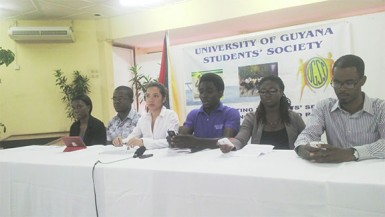Following four weeks without classes due to strike action by academic and non-academic staff of the University of Guyana (UG) over collapsed wage negotiations with the UG administration, the University of Guyana Students’ Society (UGSS) is urging both parties to resume negotiations, while distancing its “#UGRevolution” campaign from the industrial action.
“A clear distinction must be drawn between the current industrial action at the university and the [fight] of the students for improved facilities and learning conditions, termed –#UGRevolu-tion,” UGSS President Joshua Griffith told a press conference at UG’s Turkeyen campus yesterday.
He explained that the #UGRevolution is a deliberate attempt to challenge the complacency of students and cause them to consciously speak up and speak out against anything that is not conducive to their education and basic comfort as students. On the other hand, Griffith declared that the revolution is not political or biased.

He noted that while the UGSS stands in solidarity with the lecturers, “students… are hindered by the unions’ actions in representing their cause. Students are harshly affected.”
As a result, he said, the UGSS has formed a special committee with the mandate to ensure the soonest resumption of normal class schedules. That committee has been working feverishly to accomplish its goal, Griffith added. “I am a student. We are students,” he pointed out, adding, “We know first-hand how devastating the effects of this prevailing level of uncertainty is to students.”
Griffith said the agenda of the UGSS remains to ensure the concrete opinions of students are clearly publicised and well-represented as well as the resumption of normal class schedules with improved conditions. He added that the call goes out to the nation, the UG Council, administration and the University of Guyana Senior Staff Association (UGSSA) and the University of Guyana Workers Union (UGWU). “Our Students are suffering. Do not continue to take this quandary lightly. Bring an immediate end to this uncertainty. Our futures are in the balance,” he added.
UGSS member Elsie Harry also spoke at the press conference and noted the effects of the impasse on non-resident and non-national students. She said that category of students has hardly been mentioned although those students pay tuition fees to the tune of US$3000 and US$4000 respectively, in addition to rent. She further mentioned that some of those students were sent by their governments or workplaces and therefore may have to return home during semester breaks to fulfill obligations. Her contention is that those students have missed four weeks of classes and may not be able to attend any classes which might be scheduled to account for lost time.
She opined that the administration has not made a meaningful effort to resolve the situation.
A member of the UGSS’ special committee also spoke about the social effects of the industrial action. He mentioned instances where lecturers were being threatened by some frustrated students and they have since signalled their intentions of leaving the university. He added that
students have also signalled their belief that the situation is becoming increasingly hopeless. He said although some classes are being conducted, the atmosphere on campus is not conducive to learning.
It was also announced that the UGSS is seeking legal advice in relation to the current situation. Moreover, the body is also seeking the intervention of the University of the West Indies and the United Nations Children’s Fund.
When Stabroek News enquired about a deadline by the special committee for the return to negotiations by the two parties, Griffith said that the body does not have one. He reiterated that the deadlock was as a result of both parties holding fast to their demand and called for both to return to negotiations for the sake of the students, whom he said are the most affected stakeholders.





